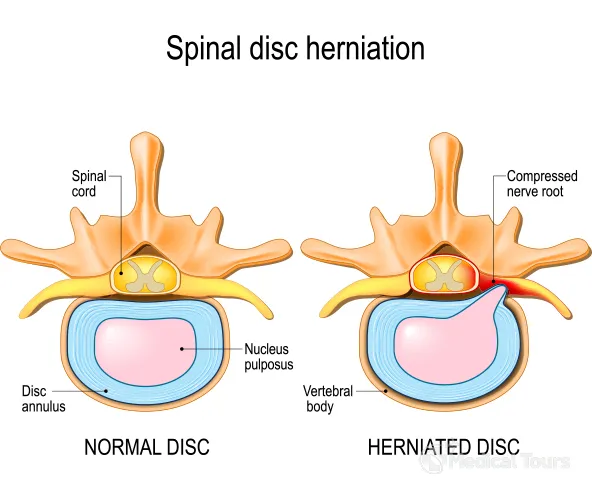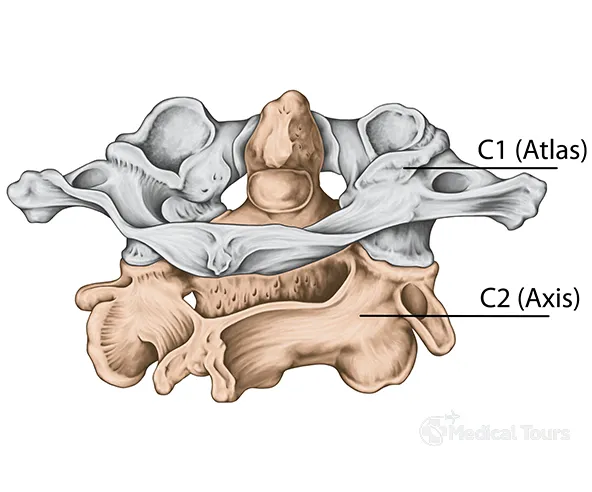What is Cervical Spine Surgery?
Cervical spine surgery is performed to remove herniated discs and fuse the vertebrae together, as well as other operations to remove tumors, treat infections or correct spinal deformities. Cervical spine surgery procedures are performed by a skilled surgeon using minimally invasive techniques that minimize scarring and recovery time. It is a type of surgery that takes place on the cervical (neck) area of your spine This part of your spine is called the cervix because it connects the head and upper body to the lower part of the body (the thoracic and lumbar areas). During cervical spine surgery, a doctor may repair or replace disks or vertebrae. Also, surgeons will fix fractures and repair bony injuries caused by trauma. Cervical spine surgery can be performed with an open approach or with robotic assistance.
What are Cause of Cervical Spine Surgery?
When a degenerative illness or deformity affects the cervical spine, surgery is required. The intervertebral disc contracts because of abnormalities or degenerative disease, causing the disc to break down. Disc herniation, also known as disc bulging, can occur because of the breakdown. A patient with degeneration disease has Numbness, stinging, weakness, and considerable discomfort in the arms and hands are the most typical symptoms of cervical spine herniation. If physical therapy and medicines do not help your symptoms, you will be referred for Cervical Spine Surgery. The operation can help to relieve anxiety in the spinal cord.
Spine Disorders and Its Treatments
Spondylosis
Spondylosis, also known as Degenerative Disc Disease, is the gradual wear and tear of the vertebral discs. It is a prevalent illness that affects 40-50 percent of adults in their forties and fifties. It most typically affects the lumbar spine (lower back). The discs contract and lose their usual height because of this abnormality. DDD can sometimes necessitate surgery. Anti-inflammatory medications and physical therapy are among the non-surgical options. At the level of the deteriorated disc, a prosthetic disc can be implanted in lieu of the spine.
Disc that has slipped
It is a condition in which the disc's inner and fragile parts swell outward due to a weakness in the disc's external surface. Back ache, pin pricks, and hurting in the arm or leg are all signs of this illness. Disc replacement and keyhole surgery, commonly known as microdiscectomy spine surgery, are two treatments for this condition. When there is a prolapsed disc in the lower back, this procedure is used.
Spondylolisthesis
It is an unusual ailment in which one vertebra bends down over another. This forward slippage of the vertebra usually occurs in the lumbar (lower back) region of the spine. This type of disc slippage puts pressure on the nerve roots that are connected to the afflicted vertebrae, resulting in pain and dysfunction. Congenital, isthmic, and degenerative spondylolisthesis are the three kinds of spondylolisthesis.
Scoliosis
A spine's normal structure is a straight column in the front and normal curvature on the sides. Scoliosis is a condition in which the front side of the spine develops curvatures in specific circumstances. The spine becomes curved in the shape of a "S" or "C" because of this condition. Adolescent Idiopathic Scoliosis is the most frequent kind of curvature. When the curvature is particularly large, surgery is recommended. Instrumentation is used to reduce the size of the deformity and achieve fusion to avoid any future curves.
Tumour of the Spine
Any aberrant growth in the spine, whether malignant or not, can encroach on nerves, resulting in discomfort, neurological problems, and paralysis. Muscle weakness, trouble walking, and loss of bladder function are some of the symptoms. Total Spondylectomy, which involves removing the entire vertebrae in a perfect curve, is the treatment for this condition.
Injuries to the spine
A spinal cord injury occurs when the spinal cord is damaged because of a trauma or accident, loss of normal blood flow, or tumour contraction. Complete and incomplete spine injuries are the two forms of spine injuries. While complete injuries result in the loss of all functions below the damage level, incomplete injuries result in the loss of some functions below the injury level. The purpose of the procedure is to stabilise the spine.
Revision surgery is also available, depending on the sort of condition a patient is experiencing. The front and rear parts of the neck are both operated on during this technique.
Symptoms That Your Cervical Spine Might Be Affected
- Agony
- Head or neck injury
- Arms and legs are weak or numb.
- Injury to the neck causes neck pain.
- Neck pain accompanied by a fever or a headache.
- From contacting chin to chest, a stiff neck makes it tough.
What are the Most Common Cervical Spine Surgery Procedures?
The following are some of the most performed cervical surgeries:
Arthrodesis (Anterior Cervical Spinal Fusion Surgery)
Anterior Cervical Corpectomy Spine Surgery
Posterior Cervical Decompression (Microdisectomy) Surgery
Posterior Cervical Laminectomy
Arthrodesis (Anterior Cervical Spinal Fusion Surgery)
Arthrodesis, commonly known as joint fusion, is a surgical treatment that unites chosen bones in the neck. In persons with advanced arthritis, the purpose of this procedure is to give pain relief, restore bone stability, and improve alignment. Arthrodesis is not appropriate for all people with arthritic joints. Arthrodesis and lateral mass plates may be required in some posterior decompression surgeries. If the upper cervical spine is unstable, a posterior arthrodesis with occipital plating may be required.
Anterior Cervical Corpectomy Spine Surgery
When the cervical illness extends beyond the disc space, the spine surgeon may suggest removing the vertebral body as well as the disc spaces on each end of the canal to totally decompress it. A cervical corpectomy is commonly used to treat multi-level cervical stenosis with spinal cord compression caused by the formation of bone spurs (osteophytes). The procedure is identical to that of a discectomy (anterior approach), with the exception that a bigger and more vertical incision in the neck is frequently made to allow for more widespread exposure.
Posterior Cervical Decompression (Microdisectomy) Surgery
Some spine surgeons choose to do a cervical discectomy from the back of the neck. Microdisectomy is used to treat large soft disc hernias on the lateral side of the spine. A Microdisectomy is a procedure that is used to treat a herniated lumbar disc. It is more effective in treating leg discomfort than lower back pain. It is accomplished by making a tiny incision in the low back's midline.
Posterior Cervical Laminectomy
Cervical stenosis can put pressure on the spinal cord, which surgeons can successfully cure with a posterior cervical laminectomy if most of the compression is in the back. The goal of a posterior cervical laminectomy is to remove the lamina to make room for the spinal cord. The outcome of a laminectomy differs from one person to the next. Most patients might expect to regain some spinal cord function improvement in their hand function and walking abilities after a laminectomy.
What Should You Do Before Cervical Spine Surgery?
Cervical spine surgery preparation entails more than just psychologically and physically preparing yourself for the procedure. There are, however, modifications you may do to make your recovery more comfortable and easier.
How to Prepare for Cervical Spine Surgery?
- Before having surgery, keep your health in check.
- Organize your home so that items you will need after your surgery are readily available.
- Two weeks before to cervical surgery, quit smoking. Smoking slows the healing of bone grafts.
- It means keeping your phone, shoes, and toiletries in easy-to-reach locations that do not require bending.
- Make a blood donation. You may be obliged to donate blood or have donations made in your name, depending on the surgery.
- Two weeks before the surgery, stop taking any drugs, including pain killers and vitamin supplements. Keep track of any medications you need to take so you may discuss them with your neurosurgeon before your cervical spine surgery.
- Have a pre-surgical physical examination at least ten days before your surgery date to determine that you are healthy enough to undergo the treatment. Blood work, urine analysis, an EKG, and a medical history will all be part of this.
- Get your hospital supplies ready. Comfortable apparel, such as pyjamas or sweatpants, as well as a robe and non-slip slippers, should be included. Get your essentials together, including a comb, toothpaste, and a toothbrush.
How much does cervical spine surgery cost in India?
Cervical Spine Surgery is the most important and most common type of surgery performed all over India. The surgeons are experienced and skilled in carrying out operations using the latest medical equipment. They offer advanced medical facilities, and one of the best recovery facilities, and they follow all the international protocols while doing the procedure. The cost of cervical spine surgery in India is around USD 4600 to USD 7,500 (INR 364800 to 594783). However, the prices may vary depending upon the hospitals in different cities.
Is Cervical Spine Surgery Risky?
Cervical spine surgery has a high success rate, however, there have been reports of problems.
The most common neck surgery complication is a dural tear (a tear in the protective covering of the spinal cord), which occurs in just 0.77 percent of cases. With a total incidence of only 0.42 percent, C5 palsy (temporary paralysis in one or both arms) is the second most common consequence.
While complications are uncommon, depending on the type of neck surgery you have, you may be at a higher risk for specific consequences.
Neck surgery complications, for example, frequently include the oesophagus. Patients who have an anterior cervical discectomy and fusion (ACDF) are more likely to experience dysphagia (difficulty swallowing), laryngeal nerve damage, and pharyngeal wall edoema.
What are the Risks and Complications of Cervical Spine Surgery?
Neck surgery carries the same dangers as any other procedure. Prior to surgery, your doctor will discuss the procedure's potential hazards with you. The following are some of the dangers associated with neck surgery:
- The surgery site is infected.
- A spinal fusion that is not entirely fused.
- Hematoma or bleeding at the surgery site.
- Areas around the surgery site are deteriorating.
- Screws or plates that become loose or loosened over time.
- Following surgery, you may experience chronic pain or stiffness.
- C5 palsy is caused by injury to the nerves or CSF (Cerebrospinal fluid) leakage in the spinal cord, resulting in arm paralysis.
Furthermore, the treatment may not be effective in relieving your pain or other problems, or you may require additional neck procedures in the future.
What are your options for dealing with it?
You can help improve the success of your operation by discussing the risks and advantages with your surgeon before you have it done.
Each patient is different, and meticulous pre-operative preparation is essential for a successful procedure. It is critical to assess spine pathology [the cause of disease or condition] as well as any other comorbidities including smoking, diabetes, and mental illnesses.
Patients should speak with their surgeon about their medical issues and how they may affect the fusion's outcome as well as the possibility of post-operative complications.
FAQs
The kind of cervical spine surgery that was done will decide how long the patient must stay in the hospital and how much help you could require right away. Many cervical spine operations only need one or two nights in the hospital.
The patient will work with the physical therapist to learn how to move properly. To move safely on a bed and up to a sitting position, suggestions will be given. The patient is anticipated to gradually advance to standing and walking.
The diet will be changed as your digestive function returns to normal because anaesthetic recovery times vary from person to person. Clear liquids are usually permitted as soon as you are able to eat. More solid meals will be provided to you if you can tolerate these.


